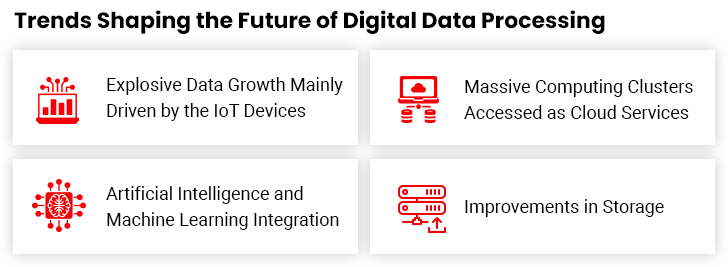As the physical world gets more connected to the digital world, data is created via almost everything, from new-age IoT devices traffic sensors and cameras to heart rate monitors. This provides richer insights into human and ‘thing’ behavior. Given such a sheer volume of available data, there has never been a better time to achieve the right business impact. After all, it can tell whether or not a company is moving in the right direction, uncover areas that can be improved, and guide how to go about implementing those improvements.
At the same time, data in its raw or most basic form is virtually worthless. It gets a voice of its own when pooled, processed, and analyzed efficiently—and, that’s where business data processing comes in. As you can turn the floods of data into insights and eventually into action using data processing, it emerges as a critical component of modern business operations. Companies across various industries are constantly generating vast amounts of data, both online and offline, and harnessing this data to gain a competitive edge has become a top priority. As a leading data processing services company we have published this blog to help you explore the recent trends in data world, the reasons to outsource the data processing activities including online data processing and offline data processing, the related use cases where new-age technologies are helping firms to get access to automated data processing solutions.
Recent Trends in Digital Data Processing Landscape
The world’s data output has reached unprecedented levels, with the volume of data generated expected to grow exponentially in the coming years. As per the latest estimates, approximately 328.77 million terabytes of data are generated each day. This number is projected to reach 181 zettabytes of data by the year 2025. This explosive growth is fueled by the increasing adoption of digital technologies, IoT devices, and the expansion of online activities.
Data hasn’t only increased in volume, but has also gained tremendous richness and diversity. Such vast increases in the amount and complexity of data require greater computational power as well as infrastructure to access and analyze it. The combination of data and computational power fuel futuristic Machine Learning methods such as Deep Learning and Neural Networks.
The confluence of data, computational power, algorithms, and storage has set the wave for creative disruption. Each of these trends has altered the way businesses pool and process their data. From e-commerce transactions to social media interactions, online data processing solutions are responsible for processing and analyzing vast amounts of data in real-time. In addition, offline data processing remains essential for industries such as manufacturing, healthcare, and finance, where data is generated and processed locally, often on-premises, before being integrated into larger systems.
Turning Raw Data into Insights: The Value Proposition of Data Processing Outsourcing
Along with the vastness of data comes the challenge of efficiently managing and processing the most important corporate asset. Some of the probable reasons could be non-linear scalable solutions, legacy storage solutions, proprietary architectures, inefficient storage data services, lack of multi-protocol storage support, and performance bottlenecks. This is where data processing companies play a pivotal role.
These professional providers are already equipped with the potential required to gather, process, and analyze data, irrespective of its volume or complexity. Here are some compelling reasons why businesses should consider outsourcing data processing services:
1. Cost Optimization
Outsourcing data processing can significantly reduce operational costs as businesses can eliminate the expenses associated with hiring and training in-house data processing teams, maintaining infrastructure, or implementing specialized software. In contrast, offloading such essential but non-core tasks to specialists not only helps businesses keep a check on expenses, but also sustain profitability in the long run.
2. Professional Excellence
An increase in the volume and variety of data can lead to data duplication and inconsistencies. Invariably, humongous volumes of data to sort through and process add to the pressure on stakeholders to make accurate decisions on time. Business as usual, data processing providers possess the expertise and experience necessary to capture, extract, digitize, and process data, irrespective of its origin, ensuring accuracy and compliance with industry standards.
3. Versatility
As data volumes grow, only a fraction of data from connected devices is ingested, processed, queried, and analyzed in real-time. Companies with limited data processing capabilities and the challenges of adopting more modern architectural elements often have to choose between computational intensity and speed. In such instances, outsourcing allows for flexible scaling up or down based on current needs. Besides, professional data processing companies are equipped with state-of-the-art technology and tools, ensuring that businesses benefit from the latest advancements in data processing solutions.
Transform Your Raw Data into Useful Insights with Our Data Processing Services
Harnessing Data Processing for Businesses Solutions
As data has become the new corporate asset class, data processing has become an indispensable tool for businesses to derive valuable insights and actionable information, which can be used to streamline operations and make data-driven decisions. For instance, pooling and processing customer interactions provides a wealth of intelligence for sales, marketing, and product development while analyzing internal business processes generates information that can be used to optimize operations and improve productivity. Let’s explore a few more use cases:
- Retail and eCommerce
In the retail and eCommerce industry, knowing your customers and delivering the right product via the right channel at the right time is important. Preferences are often governed by the latest industry trends and can change quickly; hence, staying on top of the trends is vital to ensure long-term success. Data processing solutions help analyze customer preferences, uplift inventory management, optimize prices, and personalize marketing campaigns. Retailers can improve customer experiences and boost profitability by capitalizing upon every sales opportunity.
- Healthcare and Life Sciences
Data is present in multiple formats in healthcare including laboratory results, medical images, insights from medical devices, and information from Hospital management systems. Collecting, processing, and analyzing all this information is not only beneficial for revenue growth and process optimization, but also assists in patient record management, medical billing, and drug discovery. It also enables predictive analytics to identify potential health risks (quite literally saving people’s lives) and improve patient outcomes.
- Finance
The finance sector including Insurance relies heavily on data processing for risk assessment, fraud detection, and algorithmic trading. Accurate and timely data processing is essential to get real-time stock market insights and ensure financial stability and compliance as things change as stock prices go up or down, every minute or so. Access to updated information also allows for smarter decision-making and thus for a reduction in errors.
Take another case of loan risk assessment in banking. To decide whether a customer should be given a particular loan, bank employees first have to figure out if the person in question will be able to pay it back. For this, financial experts process and analyze the customer’s existing assets, credit history, and the like. With custom data processing solutions, banks can merge digital information from multiple sources quickly to get clear insights via intelligent dashboards. This speeds up the entire process and helps representatives to get back to their clients in a more efficient manner.
- Manufacturing
The Industrial Internet of Things (IIoT) has ushered the modern manufacturing industry into a new era of performance management, reduced downtime, streamlined operations, and enhanced efficiency. The companies in this sector use data processing to monitor production lines, track quality control, and predict maintenance needs. Combining IoT devices with data processing and analysis technology lets manufacturing companies monitor assets in real-time and get status updates on their health, utilization, and availability. Furthermore, organizations can schedule preventative maintenance by leveraging Machine Learning algorithms that learn from past machine failures and identify the warning signs.
- Supply Chain, Logistics, and Transportation
Effective supply chain operation hinges on proficient inventory management. Yet, to make sure all the processes run smoothly, it is essential to constantly monitor stock levels. Data processing can assist you with this. In logistics and transportation, you can optimize routes by gathering, processing, and analyzing data about traffic trends and previous journeys. As a result, you can decrease fuel usage and increase efficiency.
Secondly, with the help of real-time data processing, you can be sure that the transportation of products that require strict condition monitoring is seamless as data from vehicles and fleets can be directly transmitted to your systems and surveilled in real-time. If any issues arise, speedy alerts can be sent out to the staff and the driver, allowing for immediate action.
The Way Forward: Intelligent Data Processing and Automation
As the data landscape continues to evolve, businesses must adapt to stay competitive. Intelligent data processing and automation are at the forefront of this transformation as it uses AI-based technologies such as Machine Learning, Deep Learning, Natural Language Processing, Computer Vision, etc., to transform unstructured/semi-structured data into valuable information.
Looking ahead, intelligent data processing offers twofold benefits. It not only is the way forward to pool and process data smartly, but also reduces the risk of costly errors by handling and managing data the way humans understand and manage it. In short, intelligent data processing will continue to drive business growth and innovation, making them essential for success in the modern business landscape. Businesses that embrace these technologies will not only survive but thrive in the data-driven future.







